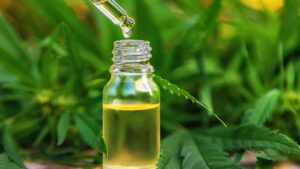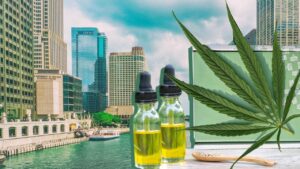In today’s wellness-oriented world, CBD (cannabidiol) has emerged as a popular natural remedy known for its potential health benefits. However, understanding how much CBD you get in a single gram of CBD oil can be perplexing. In this article, we’ll delve into the intricacies of CBD oil measurements and help you gain clarity on the matter.
CBD Oil
CBD oil has gained immense popularity for its potential to alleviate various health concerns, including anxiety, pain, and sleep disorders. However, determining the value of a single gram of CBD oil is crucial for making informed choices.
Understanding CBD Oil
Before diving into the measurement details, it’s essential to understand what CBD oil is. CBD oil is a concentrated liquid extract derived from the hemp plant, which contains a high concentration of cannabidiol. This compound interacts with the body’s endocannabinoid system, potentially offering therapeutic effects.
CBD Concentration
The potency of CBD oil is determined by its concentration. CBD products come in various concentrations, usually measured in milligrams (mg) per milliliter (ml) of oil. For instance, a 30ml bottle of CBD oil labeled 1000mg contains 1000mg.
Measuring CBD in Milligrams
We need to convert grams to milligrams when assessing how much CBD is in 1 gram of CBD oil since CBD concentration is measured in milligrams. There are 1000 milligrams in a single gram. Therefore, 1 gram of CBD oil contains 1000 milligrams of CBD.
1 Gram of CBD Oil – What Does It Contain?
So, if 1 gram of CBD oil contains 1000 milligrams of CBD, what does this mean for your dosage? The answer depends on your desired CBD intake. Some people prefer a lower dose of 10mg daily for general well-being, while others may require 50mg or more for specific health concerns.
Factors Affecting CBD Oil Potency
 The potency of CBD oil can vary depending on several factors, including the quality of the hemp used, the extraction method employed, and whether the product undergoes third-party lab testing. Choosing a reputable brand that provides consistent and accurate CBD concentrations is crucial.
The potency of CBD oil can vary depending on several factors, including the quality of the hemp used, the extraction method employed, and whether the product undergoes third-party lab testing. Choosing a reputable brand that provides consistent and accurate CBD concentrations is crucial.
Choosing the Right CBD Dosage
Determining the right CBD dosage for your needs involves considering your body weight, the severity of your symptoms, and individual factors such as metabolism. Starting with a lower dosage and gradually increasing it is a common approach to finding the optimal amount.
The Importance of Lab Testing
To ensure you’re getting what you pay for, purchasing CBD oil from companies that conduct third-party lab testing is essential. These tests verify the CBD concentration and screen for contaminants, providing a safe and effective product.
Common CBD Oil Formats
CBD oil comes in various formats, including tinctures, capsules, edibles, and topicals. Each format offers advantages; your choice should align with your preferences and lifestyle.
CBD Oil Pricing
The cost of CBD oil can vary widely, influenced by factors such as concentration, brand reputation, and packaging. While high-quality CBD products may be more expensive, they often provide better value due to their potency and effectiveness.
Where to Buy High-Quality CBD Oil
Opt for reputable sources such as licensed dispensaries or well-known online retailers when purchasing CBD oil. Reading customer reviews and checking for product certifications can help you make an informed decision.
Safety and Side Effects
With minimal documented adverse effects, CBD is usually regarded as safe and well-tolerated. However, it’s essential to consult with a healthcare professional before incorporating CBD into your wellness routine, especially if you’re taking other medications.
CBD Oil Myths Debunked
 There are several myths and misconceptions surrounding CBD oil. We’ll debunk some of the most common ones to ensure you have accurate information.
There are several myths and misconceptions surrounding CBD oil. We’ll debunk some of the most common ones to ensure you have accurate information.
How Much is CBD in Hemp?
Hemp typically contains around 10-20% CBD, depending on the strain and growing conditions. This means that for every 100 grams of hemp, you can expect to find 10-20 grams of CBD.
How Much is 1 Gram in a Syringe?
A syringe typically holds 1 milliliter (ml) of liquid. Therefore, 1 gram of a liquid substance in a syringe would be equivalent to 1 milliliter.
1 Gram Concentrate Equal To
One gram of concentrate is equivalent to 1000 milligrams (mg) of the concentrated substance. This is a common measurement for various concentrates, including CBD.
How Much is CBD in a Gram of CBD Oil?
The amount of CBD in a gram of CBD oil varies depending on the concentration of the oil. For example, if you have 30% CBD oil, 1 gram of that oil would contain approximately 300 milligrams of CBD.
How Much is CBD in a Gram of Flower?
The CBD content in a gram of hemp flower can vary widely based on the strain, but it typically ranges from 10-20% CBD. So, 1 gram of hemp flower could contain 100-200 milligrams of CBD.
How Much is CBD in a Gram of Hemp Seeds? Hemp Oil?
Hemp seeds themselves have minimal CBD content, usually less than 1%. Hemp oil derived from seeds contains little to no CBD. The main source of CBD is the hemp plant’s flowers and leaves.
How Much is CBD in a Gram of Isolate?
CBD isolate is highly concentrated, typically containing 99% pure CBD. So, 1 gram of CBD isolate would contain approximately 990 milligrams.
How Much is CBD in a Gram of High-Quality Weed?
The CBD content in high-quality cannabis strains can vary significantly but is often lower than the THC content. On average, you might find around 1-10% CBD in high-quality cannabis flowers. So, 1 gram of such weed could contain 10-100 milligrams of CBD.
CBD Oil Price Per Gram
The price of CBD oil per gram can vary widely depending on factors such as the brand, quality, and concentration of the oil. It can range from a few dollars to over $100 per gram.
The cost of 1 Gram of CBD Oil
One gram of CBD oil can vary from $10 for lower-quality products to $100 or more for high-quality, high-concentration CBD oils.
1 Gram CBD Oil Price
The price of 1 gram of CBD oil can vary, but as mentioned earlier, it typically ranges from $10 to $100 or more, depending on various factors.
CBD Oil Gram Pricing
Pricing for CBD oil per gram depends on the product’s quality, brand, and concentration. It’s essential to compare different products and brands to find the best value for your needs.
Pricing for 1 Gram of CBD Oil
The pricing for 1 gram of CBD oil varies widely, so shopping around and comparing prices is recommended to ensure you’re getting the best deal for the specific product you want.
Conclusion
In conclusion, understanding how much CBD is in 1 gram of CBD oil is essential for effective dosing and maximizing the potential benefits of this natural remedy. Remember to start with a lower dose and consult a healthcare professional with concerns.
FAQ
Is CBD oil legal?
CBD oil legality varies by location; therefore, it’s crucial to review the laws and ordinances in your area.
Can you overdose on CBD oil?
CBD is non-toxic and not associated with fatal overdoses. However, excessive use may lead to mild side effects.
How long does it take for CBD oil to work?
The onset of effects varies, but CBD typically takes 30 minutes to 2 hours to take full effect.
Is CBD oil addictive?
CBD is not considered addictive; moreover, it doesn’t produce the psychoactive effects associated with THC.
Can I give CBD oil to my pets?
CBD products are designed for pets, but it’s essential to consult a veterinarian before administering them.
How many drops of CBD oil is a mg?
It varies depending on the concentration, but roughly 1-2 drops contain 1 mg of CBD.
How much CBD is in 1 ml of oil?
Typically, 1 ml of CBD oil contains about 20-30 mg, but this can vary by product.
How much CBD oil for first-time use?
Start with a low dose, around 5-10 mg, and gradually increase until you find your ideal dosage.
How much CBD oil is in a teaspoon?
A standard teaspoon holds approximately 5 ml of liquid, so it may contain 100-150 mg of CBD, depending on the concentration.
What is 1g of CBD oil?
One gram of CBD oil contains 1000 mg of CBD.
Is CBD a drug?
Cannabis plants contain the chemical substance CBD (cannabidiol). It is not considered a drug but is used in some medications and supplements for various purposes. The legality and classification of CBD can vary significantly by country and state.




